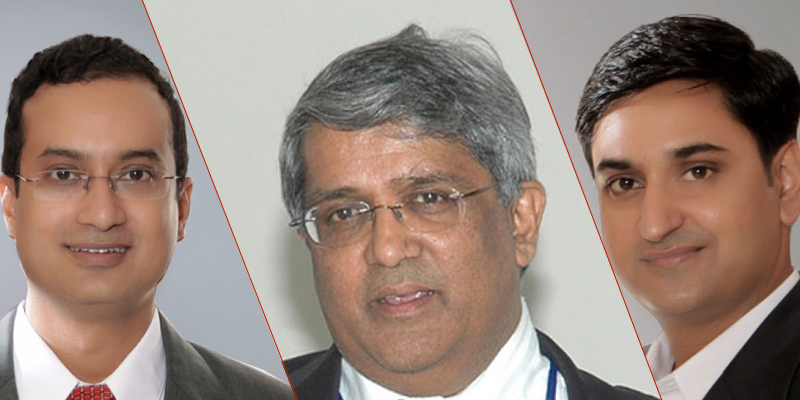Even after years of development in the medical field, cancer still invokes shock and fear among people. This is because of expensive treatments, poor survival rates, and the fear of relapse.
According to the 2016 data by National Cancer Institute, AIIMS, India may record over 17.3 lakh new cases of different kinds of cancer, and can lose around 8.8 lakh patients to the disease this year.

Surojit Bose, Dr Pradip K Bhatnagar, and Pankaj Sharma (Credit: LeadInvent Pharma)
Taking the cancer treatment to the next level is LeadInvent. Founded in 2015 by Dr Pradip K Bhatnagar, Pankaj Sharma, and Surojit Bose, the US and Kerala-based startup is trying to combine the power of nanotechnology and laser to increase the efficiency of brain cancer treatment.
Dr Pradip comes with 30 years of experience in drug discovery sector and held the responsibilities of a President (India) at Ranbaxy Drug Discovery which got acquired by Daiichi Sankyo. Meanwhile, Pankaj worked as the project leader for IIT Delhi’s HCL Tech life science vertical, and Surjoit headed the supercomputer operations and strategic planning at IIT Delhi.
LeadInvent is not involved in developing new drugs for cancer but is trying to improve the existing drugs via nano formulations. The startup is registered in the US and has its research and development centre in Kerala.
“We were looking at ways to improve the existing drugs. We wanted to see if we can make the drug better by making its nano formulation to precisely reach the cancer cells. While researching, we realised that most of the problems lie with cancer because most of the drugs used can be harmful as it kills not only cancer but also some healthy cells of the patient. We wanted to develop a more precise product which will preferentially kill the cancer cells and not much of the healthy cells,” Pankaj tells YourStory.
The challenges
Pankaj explains that for treating brain cancer, removing the tumour surgically is the best treatment available at present. However, he says that it is always a challenge for doctors to remove the entire tumour as they are worried they may damage the healthy brain cells in the process. And even after removing the tumour, the remaining small percent of cancer cells can regrow in 90 percent of the patients, leading to relapse within six to seven months. These remaining cells also carry mutation, thus making them chemo and radiation resistant.
“Brain cancer, especially Glioblastoma, is a very tough disease to treat. Developing drugs for this form of brain cancer is challenging from two perspectives. Firstly, Glioblastoma contains cells that are resistant to chemotherapy and radiation, and it has a very high recurrence rate. Secondly, it is very difficult to deliver the anti-cancer drug to brain due to the blood-brain barrier whose purpose is to prevent entry of nefarious substances circulating in the blood into the brain. To overcome this challenge, we are developing a novel gel, which can be applied directly to the cancerous tissue left over after the surgery. Doctors also do not have to be concerned with the blood brain barrier,” says Dr Pradip Bhatnagar, CEO and Co-founder, LeadInvent.
The solution
The GBGel contains smartly designed nanoparticles which are sensitive to laser light. “The nanoparticles, once activated using a certain frequency of red laser light, will release unstable oxygen molecules, which will kill the remaining cancer cells,” says Pankaj.
He explains that the gel has been developed in a way to ensure the cancer cells absorb the gel more than the healthy cells, thereby targeting precisely the leftover cancer tissue.
Explaining about the application of the product, Pankaj says, “After the surgeon removes 98 percent of the tumour in the surgery, the doctor needs to spray the GBGel inside the cavity and wait for 30 minutes, during which the gel gets absorbed by the cancer cells. The doctor then uses a fiber optic laser on the cavity to activate the nanoparticles, which will kill the cancer cells. This method can kill chemo or radiation resistant cells or any other cancer cell which may have escaped treatment.”
According to the co-founders, this treatment may reduce the chances of relapsing and also elongate the time of relapse.
The product was developed by the startup in partnership with experts from Amrita Nanoscience Center in Kochi. The startup’s lead product, GBGel, is patent protected. Surojit adds that the company has already completed the testing of the product on live cells and in small animals such as lab rats.
“Currently the startup is in talks with Indian and US pharma regulator Food and Drug Administration (FDA) to understand the regulatory study data that they need to submit before starting human clinical trials,” the co-founders say.
The co-founders added that the testing on the lab rats revealed that animals treated without the gel were at a higher risk of death.
“Our results revealed that GBGel can kill the brain tumour cells, and even those cancer cells which can be refractory to radiation and chemotherapy. We have noticed that in animal model, GBGel, when activated with low-energy laser light, can prevent cancer from growing. We hope the product will prevent cancer from re-growing in human beings after the surgery, and will become a novel modality to compliment surgery and improve the post-surgical outcome,” Pradip adds.
Previously, scientists have been trying to come up with drugs and medical solutions to treat cancer more effectively. According to a 2019 news report by Boston Herald, an American daily, similar research is being done by Dr Natalie Artzi of Brigham and Women's Hospital. According to the reports, Artzi developed an adhesive hydrogel for killing brain cancer cells. The hydrogel, which could be sprayed or injected in the brain, releases drugs and nanoparticles that activate the immune system and detect and destroy cancer cells.
Business and future plans
According to the co-founders, the startup is currently looking to start its clinical trials in the next 12 to 18 months. The human clinical trials are conducted in phases and can take upto four to five years depending on the result. Only after successful completion of the trial, LeadInvent will be able to launch the product commercially in the market.
Speaking about the business plan, Surojit explains that human clinical trials also need a lot of funding. According to him, the company raised funding and work on the development of the product. Following this, LeadInvent will licence its IP to a bigger pharmaceutical company, which would also invest in completing the clinical trials.
While the founders declined to share any funding details, they revealed that the startup has been backed by angel investors from India and Switzerland.
(Edited by Megha Reddy)
Want to make your startup journey smooth? YS Education brings a comprehensive Funding Course, where you also get a chance to pitch your business plan to top investors. Click here to know more.
Link : https://yourstory.com/2020/07/startup-nanotechnology-brain-cancer-surgery
Author :- Shreya Ganguly ( )
July 09, 2020 at 05:20AM
YourStory

